INDIGENOUS BUSINESS AUSTRALIA




IBA CEO Kirsty Moore and Chair Eddie Fry spoke with Australian Institute of Company Directors on how IBA is working toward the economic empowerment of First Nations communities. The resulting article describes IBA's 'powerful activities' which has transformed the dream of home ownership into reality, for 21,000 owner-occupier Indigenous families and individuals.
See full article below, which appeared on the AICD website.
Home ownership. For many First Nations Australians, it’s a dream which will only ever remain out of reach and a remote fantasy. But for 21,000 owner-occupier Indigenous families and individuals, it’s an idea which has at last actually transformed into reality, due to powerful activities by federal agency Indigenous Business Australia (IBA).
Roughly, we are nearing 5,000 home loans nationally at this point in time,” IBA CEO Kirsty Moore GAICD told the AICD in a recent interview in Perth. “And we continue to have very, very strong demand.
“The Indigenous home ownership program is the longest running program in the Indigenous affairs portfolio and it's been around for almost 50 years.”
According to the 2021 census, only 41 per cent of First Nations people own their own homes, compared to 66 per cent of non-First Nations people. “So there's a gap,” says Moore. It's a real gap in home ownership. For as long as that gap exists, IBA will need to play a role in in providing that finance where the mainstream banks won't.
“The need for that finance isn't just the fact that our customers live in maybe regional and remote areas where banks do not lend… but it's also because they don't have the bank of Mum and Dad. They don't have that intergenerational asset to support them. And they don't necessarily have role models in their community to look at - people who've owned a property.”

IBA also finances First Nations businesses. These range from small businesses such as Kakadu Kitchen, a non-alcoholic drinks entity with a store in Humpty Doo, and Mack Construction NT, a design and construction service, through to bigger enterprises such as the Centre for Appropriate Technology in Alice Springs, Warialda Engineering and Welding based in NSW, and Wilpena Pound Resort in the Flinders Ranges in South Australia.
IBA is working with First Nations organisations across Australia and has joined forces with Export Finance Australia to empower First Nations companies to build their capacity to enter international markets.
IBA has an investment pipeline manages a portfolio of co-investments with Indigenous organisations valued at over $500 million, including direct investments, managed funds and a real estate investment trust. According to the IBA 2023-2024 Corporate Plan, IBA currently has $2 billion in net assets, which it aims to grow to $2.5 billion by 2028.
IBA Chair Eddie Fry, a Dagoman-Wardaman man from the Katherine region in the Northern Territory, told the AICD that IBA has already doubled net assets from $1.15 billion in 2014 to around $2 billion now. “We have cleaned up a lot of non-performing assets and we also have a board that clearly understands the commercial marketplace,” he said.
“We got smarter at doing business. In 2017, we made a massive leap from about 450 home loans to about over 900 in that one year.”
Management culture has also changed both at board level and at the operational level and offices such as the ACT have been downsized. “I would suggest we've taken on a greater corporate and operational approach than we used to have.”
The future
Over the next five years, IBA will facilitate new investment opportunities and new partnership arrangements to increase wealth and assets. It has boosted this work through recent partnership activity with the Northern Australian Infrastructure Facility (NAIF), Housing Australia, and Export Finance Australia (EFA), and in strategic banking partnerships with Australian Unity and Bank Australia.
According to the 2021 national census, there are now nearly one million First Nations people in Australia. The population of Aboriginal and Torres Strait Islander people now sits at around 984,000.
However, high interest rates and high property prices are making home ownership a more difficult proposition for many First Nations people.
“I think a big challenge going forward is to see how IBA can exceed what market conditions are currently determining. In the previous two years, house prices have just skyrocketed. Therefore, that’s going to impact on the ability of our buyers to borrow,” says Fry.
Because first homebuyers are struggling to find properties to purchase, IBA launched in August a shared equity program, which combines a finance option with an IBA home loan. The borrowing capacity of customers is increased, so they do not need to buy smaller properties than they need. “They still borrow the same amount, but by IBA putting in an equity contribution, the customer can hopefully buy a more appropriate home in a better location, with proximity to amenity and family, community in particular,” says Moore.
She says the focus on regional areas is important. Over 60 per cent of the home loan book of IBA is in regional Australia, mostly Queensland and NSW, she says. About 10 per cent is in remote areas, mainly in the Northern Territory and Western Australia.
“That's where the IBA business investment activity comes in, because we believe that if we can create local economic development, that will create opportunities for people ultimately to take control of their own futures.
“We know that home ownership provides security. A roof over your head. We also know this concept of passing assets onto kids really resonates strongly with our customer base, who want to give their kids a bright future. So they want to own a home, and they want to pass on the home. They want those kids to know that they can lay their roots in that place.”
She says IBA is governed by federal legislation and is obliged to make sustainable investment decisions to ensure that when lending to customers, the risks of ultimate financial losses are minimised through good customer support and sensible lending decisions in the first place.
“It is the IBA support which is the bit that creates success,” says Moore. “So it's the support around readiness to enter into that financial commitment in the first place. And making sure that if somebody is going to buy a house, they really understand the obligations of home ownership, that they really understand what it will mean and how they're going to withstand certain pitfalls that might come – that they have financial literacy. We support them through the customer journey for the entire length of the loan.”
UK-born Moore became CEO of IBA in May 2021, after starting as IBA Head of Products and Markets in early 2018. Driven by a passion to help people who need support, she has lived experience of difficulty with home ownership and brings this understanding to her role.
“I think part of my motivation is the fact that I come from disadvantage myself. My family come from a social housing background in the UK and I understand about opportunity. So, for me, I really want to support a cohort of society that needs assistance. It’s really as simple as that.”
Role of the board
The IBA board is composed of majority First Nations members alongside non-Indigenous members – all with business expertise. “Our board understands our customer base, so they understand some of the challenges that sit in community, they understand some of the issues of intergenerational trauma and they understand the concept of a proper fair go,” says Moore.
“They don't want IBA to be purely giving handouts. They want IBA to be investing with people who are ready to actually have a bit of gumption and go forward and take control of their own economic future.”
The board is also heavily focussed on cyber security and in 2021 created an IT subcommittee. “This is a new thing that we put in place a couple years ago in response to the need to make sure technology starts at the board level.
It recognises that we do need to have modern day banking systems, and appropriate data protection in place,” she says.
The board has also driven and monitored a significant digital transformation to update IT and core business systems. “We went from having quite old-fashioned IT systems to being on the cusp of having a modern-day banking system that is used by mainstream financial services institutions. The board has supported the organisation to do that and played an active role in the oversight of that initiative.”
The board is very engaged on the subject of cyber security, inquisitive and keen to understand it, she says. “They're definitely not passive when it comes to technology and implications of cyber and customer protection in general.
“Remember that we are here not only to deal with very sensitive information pertaining to the most disadvantaged but there's also a reputational risk to the Commonwealth government, if we get it wrong.”
Ben Tyler, a Bininj man and entrepreneur, said no to kunbang (poison, alcohol) when he saw the problems it can bring to his and other communities.
His personal sober lifestyle journey is what inspired him to start his business Kakadu Kitchen. He's recently opened a non-alcoholic drinks store in Humpty Doo which sells a range of delicious drinks that infuse authentic Kakadu native botanicals.
In this video he shares his inspiring business journey story, his challenges and his plans for the future.
I grew up in the Northern Territory in a remote community which shaped my values and provided me with a lot of resilience. I am a very family orientated person and love to spend my spare time with family. I have quite a big family with four children and nine grand kids. I enjoy bush walking, photography, travelling, exploring, and going on adventures.

I am currently the Senior Program Officer for IBA’s Business Solutions Team in Cairns (Yidinji Country). My role involves a continuous improvement approach to identify opportunities and solutions during program/projects lifecycles, provide advice, training and support to internal Business Solutions staff, wider IBA networks and external customers.
For example, First Nations workshop attendees, organisations and facilitators, report on and monitor our KPIs to ensure our targets are on track and review quality standards along with considerable work on the systems and processes that support these projects.
I studied and went to school in Queensland. I attended James Cook University where I did a degree in Business. I have worked in several different places ranging from Federal and State Government to major banks and non-for-profit organisations.
Over the last five years I have been working in the Indigenous non-for-profit sector and was mainly based in Northern Territory and the Cape in far north Queensland. After a while I realised, I wanted to be closer to family and saw a position at IBA in Cairns open. I decided to take the chance and have been here for almost a year now.
I have always had a passion for family especially children, I believe to help children and families we must look at how we can help adults. When I lived in Northern Territory, I witnessed first-hand the impact of poverty, homelessness, and the discrimination against Aboriginal and Torres Strait Islander peoples.
My job allows me to support and create an impact within Aboriginal and Torres Strait Islander communities. It is creating and establishing action to encourage impact, physical action will get an outcome.
I grew up riding horses and always thought they were beautiful spirits, especially Arabian horses. They are such a fiery horse, that smell and look nice. They have such healing spirit, that I sometimes prefer them over people.
IBA’s communications intern and Wiradjuri woman, Zenae Powell, sat down for a yarn with Indigenous Business Month (IBM) co-founder, Dr Michelle Evans, about all things IBM – a month dedicated to celebrating Indigenous businesses, leaders and people within the sector. Michelle is an Associate Professor at Melbourne University and involved in many community-based actions that encourage and advance the great work of Aboriginal and Torres Strait Islander people in business.

IBM is in its ninth year since it was created back in 2015. Now going for nine years strong, IBM has created an impact within the Indigenous community, especially within the business sector, where Indigenous business, employment and leaders continue to grow.
We celebrate and showcase Indigenous business success, excellence, and leadership.
Each year we celebrate and flesh out what the sector values about Indigenous business. This is important because there is very little coverage in the mainstream of the diversity and excellence of the Indigenous business sector. We felt that raising the profile of the sector and telling those stories was so important, not only to raise awareness but also to encourage young people and those who were business hesitant to give it a go.
Next year is 10 years and we’ll be doing bigger and better things for that.
With IBM being held at the same time as the referendum, the inspiration for the theme this year was to recognise the importance of gathering together to support one another during this time. The theme touches on community, especially the community of Indigenous businesses, and the unity and support within First Nations communities.
We thought about how people would be feeling during this time and wanted a theme that would support them. The theme highlights the importance of connection and local safe space gatherings where Indigenous people within the business sector can support, uplift, and celebrate one another. This month showcases many amazing stories from Indigenous businesses and leaders.
The theme encourages people to gather, to seek solace and feedback, and to generate friendships and connections which are at the heart of Aboriginal and Torres Strait Islander culture, in that relational way of being and doing.
The aspiration of IBM is to continue to encourage Indigenous businesspeople to run their own events and for governments and corporates to cooperate and partner with Indigenous business leaders all over the country to support and showcase the events. It is a very democratic initiative where individuals and organisations can contribute by adding events, supporting local businesses, and staying informed with Indigenous leaders within the business sector.
IBM will continue for as long as we find it exciting and positive, as long as it remains as Indigenous business driven. It is the love of creating.
Dilin Duwa exists because of the Indigenous business sector. We have over 300 Indigenous entrepreneurs who have been through our programs. They are the stakeholders of the sector, to provide education through the Murra program and through our grad certificate in Indigenous business leadership. We also do a lot of research, and we get approached by Indigenous organisations to participate in research regarding Indigenous business.
Our work provides education, programs, and dialogue to regional communities, which has been in partnership with IBA. To build Indigenous business in regional parts of Australia, it is important to support and engage with Indigenous businesses and leaders on the ground. They’re the ones doing Blak coffees and who government and other partners like IBA or Supply Nation may go to.
Dilin Duwa’s work supports Indigenous businesses and their leaders to feel economically empowered. To create that shared language about what success is, and the role that Indigenous ecosystems and philosophies have in how First Nations people do business.
The impact of the snapshot thus far is about illuminating registered Indigenous businesses, and demonstrating how many people are employed, how much money is being generated and quantifying the significant contribution of Indigenous businesses to our economy each year.
This is the third year doing the snapshot, and it continues to build more insight into the Indigenous business sector as more and more Indigenous business registries participate.
The picture I used for the research was a spider’s web. During the winter, where I live, there are these intricate webs that grow, and then disappear, and new webs need to be built. I love that metaphor from country, which is kind of like the snapshot. This is what it looks like during the years, and it informs how we, and how policy, can help the shift, grow, and supercharge to create a different snapshot next time.
At the moment we have initiatives, programs and education, but there are so many more possibilities. The snapshot allows us to open up those possibilities and lays the foundation for the future development of the sector.
Get on the wild side, the buck wild side, and check out the Black Magic Woman vodcast - Episode #112 featuring Lacey Long a proud Kamilaroi woman and owner of Buck Wild Country. Lacey talked with vodcast host, Mundanara Bayles, about her business journey, family/friends, and words of inspiration to all inspiring entrepreneurs.

Previously working in government agencies and even starting her first business of a clothing boutique at 18, Lacey always knew she would be in business. She transitioned into her current business, Buck Wild Country, after a need for lifestyle change now that she has a daughter – her focus was to merge her inspirations both as a business owner and as a parent.
With a business start-up loan from IBA, Lacey used the funds to purchase stock for the men’s and children’s clothing line of Buck Wild Country.
The business is inspired by BOHO country aesthetic with a variety of clothing to live your ‘buck wild side’. With beautiful hand drawn designs, Lacey’s business goes beyond country and continues to grow.
From what started with one design for men, the business quickly grew to over 20 designs for men, women, and children. Today, Buck Wild Country is proudly an Australian country lifestyle and fashion brand, built with love for the whole family.
As part of our Strong Women Strong Business network, Lacey spoke at a Lunch & Learn session last year that brought together her business experience with the importance of money management.
In the recent Black Magic Woman vodcast, Lacey shared some words of wisdom and reality to aspiring business owners: “Just go for it, start with your friends and family. Don’t give up and keep going, there’s going to be hurdles.”
With these inspiring words, the only thing holding you back, is you.
Watch the vodcast episode or check out Buck Wild Country across socials or on their website, buckwildcountry.com.
~~~~~~~~~~~~~~~~~~~~
IBA is proud to sponsor a series of strong women in business for this year’s Black Magic Woman pod- and vod-casts. If you would like more info on all the Black Magic Woman yarns, visit the website, blackmagicwoman.com.au/iba-partnership-series/.
To find out more about how you can start or grow a business, visit Starting a business.
On the recent episode (#110) of Black Magic Woman, Mundanara Bayles hosted Priscilla Mason, a proud Worimi woman and one of the directors of Indigeco. Priscilla talked about her passion for promoting employment opportunities for Indigenous individuals and communities.
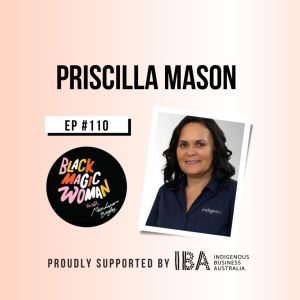
Started in 2017 with funding provided by IBA via a start-up loan package, Indigeco is a Supply Nation certified business that specialises in recruitment across both regional and metropolitan areas.
“Money was tight, but IBA took a chance on me. I can’t thank them enough,” says Priscilla.
With a start from humble upbringings and experience in the construction industry, Priscilla and her husband, Todd, saw the opportunity for growth in Aboriginal employment. In the beginning they started off on small construction sites, with only two labours. Now they provide several services ranging from employment, consulting on major construction projects and more.
The business now also has a training side of things with MobReady, which has VET accreditation to skill up Aboriginal and Torres Strait Islander youth to find career pathways in the labour hire space.
Indigeco continues their relationship with IBA as they grow. They use our invoice financing, a service that helps our customers whose cash flow can’t keep up with their growth.
“I still use them (IBA) today. They are fantastic,” says Priscilla.
Find out more about Indigeco’s story through the vodcast or visit their website, indigeco.com.au.
~~~~~~~~~~~~~~~~~~~~
IBA is proud to sponsor a series of strong women in business for this year’s Black Magic Woman pod- and vod-casts. If you would like more info on all the Black Magic Woman yarns, visit the website, blackmagicwoman.com.au/iba-partnership-series/.
To find out more about how you can start or grow a business, visit iba.gov.au/business/.
Black Arc Industries are a 100% Indigenous owned business in Alice Springs NT that does custom welding, modifications, and repairs on steel, stainless steel, and aluminium. 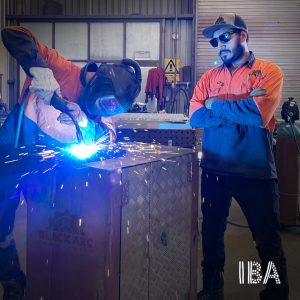
Hayden Jude is a proud Batcho man of the Larrakia family and the owner of Black Arc Industries. He talked to IBA about the hard work of running a business and how to keep things real when it’s a family business.
What’s the best thing about owning your own business?
The best thing about owning your own business is that you get to be your own boss. You get to have the freedom to make decisions that align with your personal values and goals.
I also have opportunity to make a positive impact on the lives of our clients and employees. By creating a positive work environment and providing quality products and services, you can help others achieve their own goals and aspirations.
How has IBA helped you and/or your business?
We used a business loan to purchase a truck, trailer, and excavator, which have been valuable assets for the business.
IBA believed in me and my business plan and worked alongside us to get things happening. Through IBA we have also been put in contact with various other organisations which has been instrumental in the success of the business.
If yours is a family business, what’s the secret to making it work?
Firstly, you need to like them [haha]. 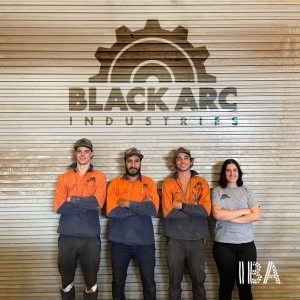
You need to have good communication and boundaries in place!
Find out more about Black Arc Industries: blackarc.com.au/ or instagram.com/blackarc_industries/.
Find out more about IBA business support.
Check out the second installment of the new vodcast series that we're partnering on with Black Magic Woman! In this episode, host Mundanara Bayles yarns with educator and community leader Tanyah Nasir on beautiful Larrakia country.
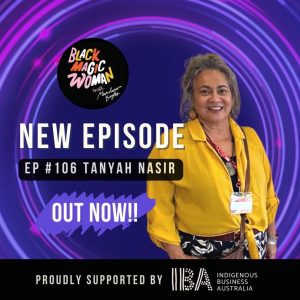
Black Magic Woman explores issues of importance to First Nations people and communities. and we've partnered on a number of episodes with topics from housing, business, youth, women, investing, financial literacy, economic development and COVID-19 recovery.
Episode 106 features Tanyah Nasir, a Darwin woman with connections to the Garrawa, Djugun, and Tiwi language groups. Tanyah is an educator with over 25 years’ experience, and prides herself on understanding the approach and methodology required to achieve success as Indigenous people.
Her program - 'Rise Up' provides a unique opportunity for First Nations people to reflect on their distinctive lived reality and the issues they encounter on a daily basis. The Rise Up program also facilitates critical thinking and self-reflection to encourage and support personal change and social transformation to create the life they want.
Black Magic Woman is accessible on all major platforms including YouTube, Instagram, Apple Podcasts, Spotify, Twitter, LinkedIn, and Facebook.
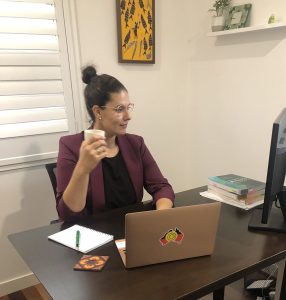
Angie had been thinking about starting her own writing and editing business for years. Then in early 2021, after a year of working from home in her salaried position and facing indefinite restrictions to meeting up with colleagues, she decided to take the leap.
IBA supported Angie Faye Martin, a Kooma/Kamilaroi woman, to get started with a business loan that allowed her to cover the costs of essential office equipment.
Angie acknowledged, “Start-up business expenses for a primarily online freelance business add up quickly. In addition to hardware, I had to purchase cloud storage, domains, insurance, legal advice and memberships to professional organisations and editing resources and style guides.”
Now, almost two years later, Versed Writings is a thriving business with a loyal client base and a multitude of business services. Her clients have included academics within Australia and overseas, a number of state and federal government departments, some large not-for-profits and numerous fictional authors.
Angie’s business is built on a passion for meaningful, tailored streamlined prose – whatever the purpose or whoever the audience.
“I believe meaning matters most. If you’re clear on what you want to communicate and the intention of your message before you sit down to write, the words will flow effortlessly,” said Angie.
Versed Writings offers content writing, copyediting and cultural sensitivity editing services.
“I started off mainly doing copyediting for academic journal articles and annual reports because that is my comfort zone and I expanded from there,” said Angie.
In a matter of months, Angie realised the high demand for content writing and cultural sensitivity editing from an Aboriginal and Torres Strait Islander perspective. She sought out the mentorship of Ngiyamppa academic Dr Mark Lock, who is an expert in the field of cultural safety editing, and IBA supported weekly mentoring sessions for three months so Angie could build her knowledge, skills and confidence in this area of growing demand.
Angie is signed with HarperCollins for her novel, Melaleuca, to be released in 2024, an outback noir crime thriller about an Aboriginal police woman called out west to investigate the murder and disappearances of Aboriginal women.
Business support comes in many different forms. IBA provides capability building, finance, and workshops for entrepreneurs and businesses wanting to develop their ideas. Find out more at iba.gov.au/business/starting-a-business.